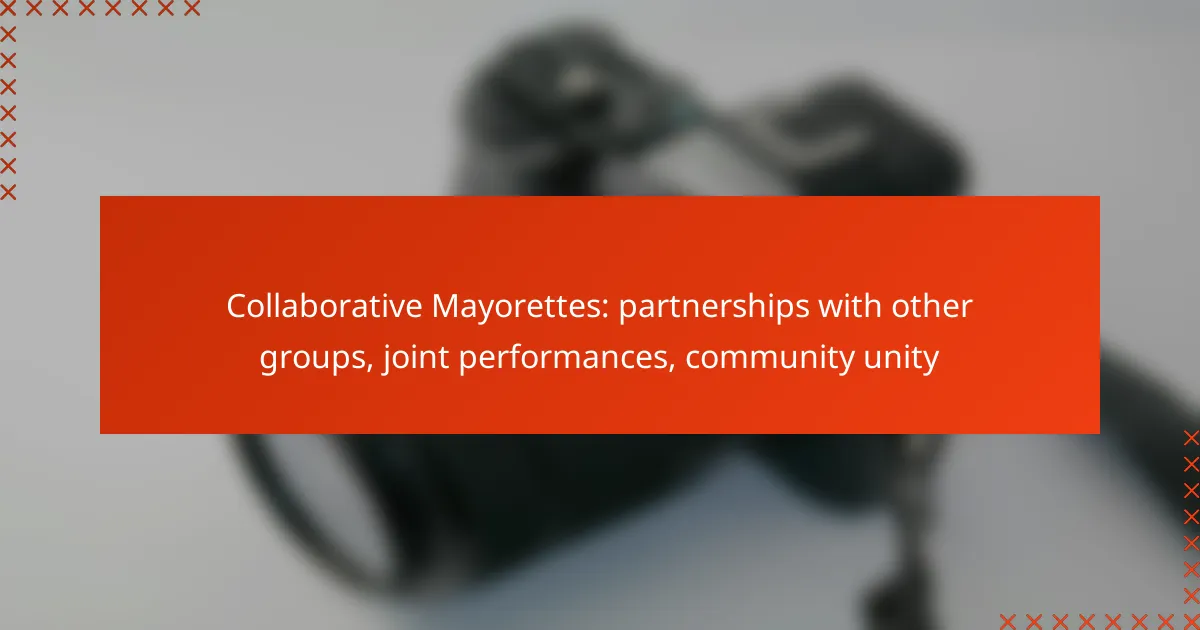Training Mayorettes involves a multifaceted approach that enhances rehearsal techniques and fosters skill acquisition. By focusing on choreography execution, communication, and leadership, participants can improve their performance and teamwork. Additionally, mentorship opportunities with community leaders and experienced alumni provide valuable guidance and support for their development.

How can Mayorettes improve their rehearsal techniques in Canada?
Mayorettes in Canada can enhance their rehearsal techniques by implementing structured practices, actively seeking feedback, utilizing video analysis, engaging in team-building exercises, and maintaining physical conditioning. These strategies foster skill acquisition and create a supportive environment for growth.
Structured practice schedules
Creating structured practice schedules allows Mayorettes to allocate specific time slots for various skills and routines. This consistency helps in developing muscle memory and improving overall performance. A typical schedule might include daily practices of 1-2 hours, focusing on different aspects like choreography, formations, and transitions.
It’s essential to balance intensity and rest to prevent burnout. Incorporating varied activities within the schedule can keep rehearsals engaging and effective.
Incorporating feedback sessions
Feedback sessions are crucial for Mayorettes to identify strengths and areas for improvement. Regularly scheduled sessions, ideally after practice, can help performers understand their progress and adjust techniques accordingly. Encourage open communication among team members to foster a constructive atmosphere.
Utilizing peer reviews can also be beneficial, as fellow Mayorettes may offer insights that coaches might overlook. Aim for feedback that is specific, actionable, and focused on skill enhancement.
Utilizing video analysis
Video analysis is a powerful tool for Mayorettes to visually assess their performances. Recording practices and reviewing footage allows individuals to see their movements and identify areas needing improvement. This method can highlight subtle mistakes that may not be noticeable in real-time.
Consider using video analysis tools that allow for slow-motion playback or side-by-side comparisons with professional performances. This can significantly aid in refining techniques and boosting confidence.
Team-building exercises
Team-building exercises strengthen the bond among Mayorettes, which is vital for cohesive performances. Activities such as trust falls, group challenges, or even social outings can enhance communication and teamwork. These exercises help build camaraderie, which translates into better synchronization during routines.
Incorporating fun, informal gatherings can also relieve rehearsal stress and encourage a supportive atmosphere, making it easier for members to express themselves and collaborate effectively.
Physical conditioning routines
Physical conditioning routines are essential for Mayorettes to maintain stamina and flexibility. Incorporating strength training, cardio, and stretching into their weekly regimen can enhance overall performance. Aim for a balanced routine that includes at least 2-3 days of strength training and daily flexibility exercises.
Additionally, consider integrating dance-specific conditioning to target the muscles used in performances. This tailored approach can help prevent injuries and improve endurance during long rehearsals or performances.

What skills do Mayorettes need to acquire?
Mayorettes should focus on acquiring skills in choreography execution, communication, leadership, and time management. These competencies are essential for effective performance and teamwork during events and parades.
Choreography execution
Choreography execution involves mastering dance routines and formations that are integral to Mayorette performances. Practicing these routines regularly helps ensure precision and synchronization among team members.
To improve choreography execution, Mayorettes should engage in consistent rehearsals, focusing on both individual movements and group formations. Utilizing video recordings for self-assessment can also enhance performance quality.
Communication skills
Effective communication skills are vital for Mayorettes to coordinate with team members and convey messages during performances. This includes both verbal communication and non-verbal cues, such as gestures and facial expressions.
To develop strong communication skills, Mayorettes should participate in group discussions and practice public speaking. Role-playing scenarios can also help build confidence in delivering messages clearly and effectively.
Leadership development
Leadership development is crucial for Mayorettes, as it prepares them to take initiative and guide their peers during performances. Strong leaders can motivate their teams and foster a positive environment.
Mayorettes can enhance their leadership skills by taking on roles in team planning and decision-making. Mentorship opportunities, where experienced members guide newcomers, can also cultivate leadership qualities within the group.
Time management
Time management is essential for Mayorettes to balance practice schedules, event preparations, and personal commitments. Efficient time management ensures that all team members are well-prepared for performances.
To improve time management, Mayorettes should create a rehearsal calendar that allocates specific times for practice, meetings, and rest. Setting priorities and using tools like planners or apps can help keep track of commitments and deadlines.

What mentorship opportunities are available for Mayorettes in Canada?
In Canada, Mayorettes can access various mentorship opportunities that enhance their skills and provide guidance. These include connections with local community leaders, experienced alumni, and participation in specialized workshops and training camps.
Local community leaders
Local community leaders play a vital role in mentoring Mayorettes by sharing their expertise and insights. They often host events or meetings where Mayorettes can learn about leadership, community engagement, and event organization. Building relationships with these leaders can also open doors to networking opportunities and collaborations.
Engaging with community leaders allows Mayorettes to gain practical knowledge and understand the expectations of their roles. This mentorship can significantly enhance their confidence and effectiveness in serving their communities.
Experienced Mayorette alumni
Experienced Mayorette alumni are invaluable resources for current members, as they have firsthand experience navigating the challenges of the role. Alumni often offer one-on-one mentorship, sharing their journeys, successes, and lessons learned. This guidance helps new Mayorettes develop their skills and avoid common pitfalls.
Many alumni also organize informal meet-ups or structured programs where they can provide advice on specific topics such as public speaking, event planning, and community service initiatives. This connection fosters a supportive network that benefits both current and former Mayorettes.
Workshops and training camps
Workshops and training camps are essential for skill acquisition among Mayorettes. These events typically cover a range of topics, including leadership development, teamwork, and effective communication. Participating in these programs can significantly enhance a Mayorette’s capabilities and confidence.
Many workshops are held throughout the year, often led by experienced facilitators or guest speakers. Mayorettes should seek out these opportunities, as they not only provide valuable training but also allow for networking with peers and mentors in the field.

What are the best practices for Mayorette training?
The best practices for Mayorette training focus on structured skill development, ongoing assessments, and mentorship. These elements ensure that participants not only acquire necessary skills but also receive support and guidance throughout their training journey.
Regular skill assessments
Regular skill assessments are crucial for tracking progress and identifying areas for improvement in Mayorette training. These assessments can take the form of practical evaluations, where participants demonstrate their skills in routines, as well as written tests on choreography and performance techniques.
Implementing assessments every few weeks allows trainers to adjust the curriculum based on individual needs. This approach helps maintain motivation and ensures that all Mayorettes are meeting expected performance standards.
Peer mentoring programs
Peer mentoring programs foster a supportive environment where experienced Mayorettes can guide newcomers. This practice not only enhances skill acquisition but also builds camaraderie among participants, which is vital for team cohesion.
Mentoring can include one-on-one sessions, group workshops, or collaborative practice sessions. Establishing clear goals and expectations for both mentors and mentees can lead to more effective learning outcomes.
Collaboration with dance instructors
Collaboration with dance instructors enriches Mayorette training by integrating diverse movement styles and techniques. Dance professionals can provide specialized training in areas such as rhythm, flexibility, and performance presence, which are essential for Mayorettes.
Regular workshops or classes led by dance instructors can expose participants to new skills and enhance their overall performance quality. This collaboration also helps Mayorettes understand the importance of artistic expression in their routines.

How do Mayorettes prepare for performances?
Mayorettes prepare for performances through rigorous rehearsals, skill acquisition, and mentorship. These elements are crucial for developing the precision and artistry required in their routines.
Rehearsal Insights
Rehearsals are fundamental to a Mayorette’s preparation, focusing on choreography, timing, and synchronization with music. Typically, practice sessions last several hours and occur multiple times a week leading up to performances.
During rehearsals, Mayorettes refine their routines, often recording sessions to analyze movements and improve techniques. Feedback from coaches and peers plays a vital role in enhancing performance quality.
Skill Acquisition
Skill acquisition for Mayorettes involves mastering various techniques such as baton twirling, dance movements, and formations. This process often includes breaking down complex routines into manageable sections for focused practice.
Mayorettes may also engage in cross-training activities like gymnastics or dance classes to build strength and flexibility. Regular assessments help track progress and identify areas needing improvement.
Mentorship Opportunities
Mentorship is a key component of a Mayorette’s development, providing guidance from experienced performers. Mentors help newer Mayorettes navigate challenges and enhance their skills through personalized advice and support.
Many organizations offer structured mentorship programs, pairing seasoned Mayorettes with beginners. This relationship fosters a sense of community and encourages knowledge sharing, which is essential for growth in this art form.



